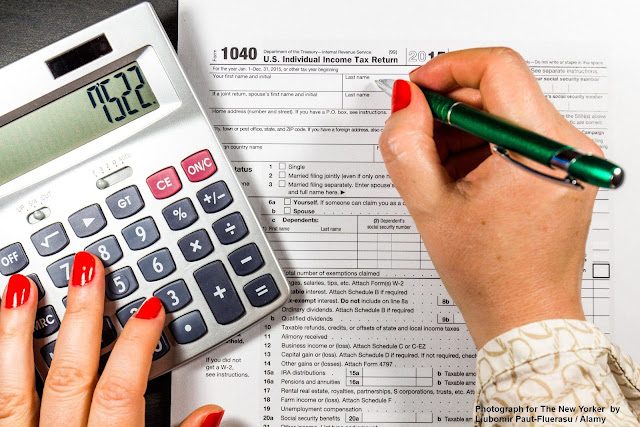'Twas the Ides of March 2017 and this blogger went to office of the CPA firm that had prepared his tax returns for more than 10 years. Not typically, the 2017 tax return was not presented by the staff member of the firm who had done the work on the 2017 taxes. Uh, oh. The receptionist handed the blogger the tax papers he had submitted along with a single page memo that informed the blogger that he had gone from a refund recipient of nearly $500 for 2016 to a tax bill of nearly $1500 for 2017. The aftershocks still rumble through the blogger as he writes this bleak account of taxes in the year of the Great Tax Cut engineered by the current occupant of the Oval Office in behalf of his base of adoring 1%ers. When the blogger encountered the droll set of suggestions for taxpayers like the blogger who will not receive a tax refund for 2017, it struck a chord of some sort. If this is a (fair & balanced) account of the real March Madness, so be it.
[x New Yorker]
What To Expect When You’re Not Expecting A Tax Refund
By Julie Vick
TagCrowd Cloud of the following piece of writing
Tax season is a time of big wins and losses. You probably went into it confidently this year, since it seemed like even five-year-old lemonade-stand proprietors would be getting a refund. But then you saw the numbers on TurboTax plummet and you faced the facts: you will owe money. Keep reading to learn more about what to expect during this challenging time.
THE FIRST MONTH: AN OVERVIEW
Week 1: Your dread is just the size of your small, unmanicured fingernail. The money you owe doesn’t really seem like that big of a deal.
Week 2: The dread now measures five inches, about the size of an avocado toast. It’s becoming hard to ignore.
Week 3: The dread is the size of a Judith Leiber couture evening bag shaped like a martini glass—the kind that even someone with a sizable refund shouldn’t buy.
Week 4: It’s basically the size of a full-grown baby who keeps you up at night. You’ll probably be managing it for at least the next eighteen years.
WHAT YOU MAY BE FEELING
Physically
• Fatigue: Your body may feel sluggish, but that probably has more to do with your avoidance of your treadmill desk than your lack of a refund.
• Nausea: Owing money can turn your stomach sour. You may want to avoid buying eight-dollar lattes because of the smell, and the fact that the barista just cut your credit card in half.
• Frequent urination: That is not about a lack of a tax refund. Call your doctor.
Emotionally
• Jealousy: Why are your friends heading out to a hot-tub party on a yacht while you are headed back to the plasma bank?
• Anger: Couldn’t you have done something different in 2017? Something other than buying a ten-year membership to a goat-yoga studio?
• Confusion: Don’t you actually believe in taxes to pay for things like education and making the U.S. more like the magical land of Norway? Why does contributing to society make you feel the sads?
• Frustration: The world is awful. If you had received a tax refund, you could have bought another pet chinchilla, and that would have raised your spirits.
WHAT YOU MAY BE WONDERING
“Is it OK for me to drink alcohol when I’m not expecting a tax refund?”
Yes, but you’ll want to stick to a bottom-shelf vodka for the next few months. Perhaps the awful taste will help remind you to put aside more money for taxes next year.
“Is it normal to feel tired all the time when I’m not experiencing bouts of rage?”
Yes.
“How will I feel once I actually pay off the money I owe?”
You may experience a range of emotions, including joy, exhaustion, and a craving for a pitcher of margaritas.
“What are quarterly taxes?”
That’s a question that many people are still working hard to better understand.
“When will the nausea go away?”
For some people it only lasts a few weeks. Others may find that it persists until they learn about someone who owes even more money than they do.
“How can I make sure this doesn’t happen again?”
Why not try having an actual baby or two? # # #
[Julie Vick is s a writer and teacher. I primarily write non-fiction including humor, parenting, and travel. My work has appeared in Parents magazine, Salon, McSweeney's Internet Tendency, The Washington Post, Paste, AFAR.com, Brain, Child, and this first contribution to The New Yorker. She also teaches undergraduate rhetoric and composition courses at the University of Colorado at Denver. Courses I teach include Business Writing, Composition, Advanced Rhetorical Analysis, and Technical Writing. Vick received both a BS (journalism) and a BA (English) from the University of Colorado at Boulder and an MA (English) from the University of Colorado at Denver.]
Copyright © 2018 The New Yorker/Condé Nast Digital

This work is licensed under a Creative Commons Attribution 4.0 International License..
Copyright © 2018 Sapper's (Fair & Balanced) Rants & Raves

No comments:
Post a Comment
☛ STOP!!! Read the following BEFORE posting a Comment!
Include your e-mail address with your comment or your comment will be deleted by default. Your e-mail address will be DELETED before the comment is posted to this blog. Comments to entries in this blog are moderated by the blogger. Violators of this rule can KMA (Kiss My A-Double-Crooked-Letter) as this blogger's late maternal grandmother would say. No e-mail address (to be verified AND then deleted by the blogger) within the comment, no posting. That is the (fair & balanced) rule for comments to this blog.